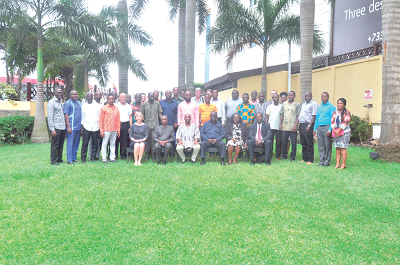A Deputy Minister of Food and Agriculture (MoFA), Dr Sagre Bambangi, said the infestation of the fall armyworm (FAW) mainly on maize crops in the country last year, was a wake-up call for the country to be pre-emptive and to prevent such outbreaks.
He said nature had a lot of gifts and it was up to humans to make the best use of them, be they negative or positive.
“So the FAW will also come and even if the maize were not there, it would have looked for some other species or plants. So we must find a way of surviving; we should put in measures that can contain situations of this nature,” he stated at a stakeholders’ workshop on the FAW in Accra.
FAW response
Dr Bambangi said interventions by the MoFA, with support from the Food and Agricultural Organisation (FAO) and other development partners, including the multidisciplinary task force to implement the strategies outlined in the National Plan for the FAW Control, salvaged about 94.3 per cent of the total cropping area that was infested by the FAW.
“So about six per cent was completely destroyed. Although in our assessment this was not a food security threat at the micro level, some individual farm households suffered food insecurity,” he indicated.
He explained that in the 2017 minor season, MoFA, with the support of development partners, set up early warning systems using pheromone traps in all the regions to monitor the presence the FAW.
From 57 locations, the traps indicated the presence and possible resurgence of FAW and in the 2018 cropping season.
Thus, the government, together with the support of development partners, research institutions and relevant stakeholders strengthened the various interventions to ensure the sustainable management of this invasive pest before the onset of the 2018 crop season.
“The FAW has become a regional problem and should be managed holistically to reduce its adverse effect on agriculture,” he said.
Way forward
The minister noted that the FAW had come to stay in Ghana due to its biological nature and so there was the need to have some dynamic approach to its management.
“The government and other stakeholders in agriculture have not relaxed in finding solutions. The ministry will employ the use of integrated best management approach for sustainable management of the FAW,” he assured.
Background
The invasion of the FAW, scientifically known as Spodoptera frugiperda (an insect pest native to tropical and subtropical regions of the Americas), was reported in April 2016 in the Yilo Krobo Municipal in the Eastern Region and in 2017 spread nationwide and threatened agriculture and food security.
The workshop
The Centre for Agriculture and Biosciences International (CABI), an international not-for-profit organisation that provides information and applies scientific expertise to solve problems in agriculture and the environment, organised the workshop in collaboration with the PPRSD. It provided an opportunity for key stakeholders to review the status of implementation of the 2017 action plan and to strategise for the years ahead.
Invasives
A Scientific Officer at the CABI, Mr Julien Lamontagne-Godwin, during a presentation on the CABI Invasive Species Programme (ISP), said the FAW was a priority species for many countries, but should be the gateway to discuss national invasive species management as a process.
He said the rationale for the ISP was due to increase in invasion risks, climate change, disproportionate impacts on the vulnerable, less coping capacity and undermining investments in development.
“Weeds, insects and pathogens are all invasive species and require different linkages and approaches.
Regional activities are challenging but are an important milestone in the future of invasive species management,” he stated.
